Expedia Group Bundle
How Does Expedia Group Dominate the Travel Market?
Expedia Group, a titan in the online travel agency realm, has consistently redefined how we plan and book travel. Their recent strategic shift towards fostering repeat business across their diverse portfolio, including Expedia and Hotels.com, signals a pivotal moment in the travel industry. This transformation has already yielded impressive results, with a significant profit surge in Q3 2024.
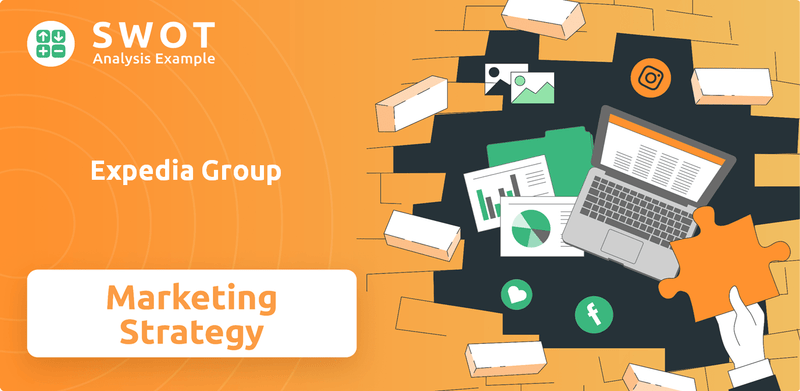
This exploration of Expedia Group's sales strategy and marketing strategy will uncover the key elements driving its success. We'll dissect their innovative digital marketing for travel tactics, analyze their approach to customer acquisition, and examine their evolving business model. Understanding Expedia Group's revenue generation strategies and competitive landscape is crucial, and you can find more detailed insights in our Expedia Group SWOT Analysis.
How Does Expedia Group Reach Its Customers?
The sales and marketing strategy of the company relies heavily on a diverse range of sales channels, both online and offline, to reach its extensive global customer base. This multi-channel approach is central to the company's business model, enabling it to capture a broad market share and drive revenue growth. The company's strategy is designed to maximize customer reach and engagement.
The company's strategy includes direct-to-consumer (B2C) platforms and business-to-business (B2B) segments. The company has expanded its B2B segment, which fuels various travel and non-travel companies, including airlines, offline travel agents, online retailers, corporate travel management, and financial institutions. This comprehensive approach allows the company to leverage multiple avenues for sales and marketing, ensuring a robust and resilient revenue model.
The company's online presence is dominated by its e-commerce platforms, such as Expedia.com, Hotels.com, and Vrbo, which serve as direct booking portals. Mobile applications are also crucial, with global app downloads for Expedia increasing by 22.5 million in 2024. The percentage of bookings made through the app rose by three percentage points in Q3 2024. The company's marketing strategy focuses on enhancing the user experience and driving bookings through these digital channels. This approach is key to its success in the competitive online travel agency market.
The company's primary sales channels are its e-commerce platforms. These platforms, including Expedia.com, Hotels.com, and Vrbo, are direct booking portals for flights, hotels, rental cars, cruises, and activities. These platforms are essential for the company's direct-to-consumer sales strategy.
Mobile applications are a critical component of the company's sales strategy. The company's apps for Expedia, Hotels.com, and Vrbo have seen increased downloads and booking percentages. The company's digital marketing channels are focused on enhancing the user experience.
The company has a significant business-to-business (B2B) segment. This segment includes Expedia Partner Solutions (EPS) and fuels various travel and non-travel companies. B2B gross bookings accelerated by 24% in Q4 2024.
The One Key loyalty program, launched in July 2023, unifies rewards across Expedia, Hotels.com, and Vrbo. Nearly 30% of travelers earn One Key points on Expedia or Hotels.com and redeem them on Vrbo. This program is instrumental in driving repeat customers.
The company's sales strategy is enhanced through key partnerships and exclusive distribution deals. These collaborations amplify the company's reach and diversify revenue streams. The company has forged alliances with airlines like Ryanair, announced in July 2024, to offer enhanced traveler choices.
- Partnership with Ryanair to offer enhanced traveler choices.
- Collaboration with Expedia Travel Agent Affiliate Program (TAAP) for independent travel agents.
- Agreements with tourism bodies like Tourism and Events Queensland.
- Partnership with Microsoft Bing, announced in October 2024, allowing Bing users to earn additional rewards.
The company's approach to sales and marketing is multifaceted, leveraging both direct and indirect channels to maximize its market presence. Through strategic partnerships and a strong focus on digital platforms, the company continues to adapt and grow in the competitive travel industry. For more insights into the company's overall growth strategy, consider reading about the Growth Strategy of Expedia Group.
Expedia Group SWOT Analysis
- Complete SWOT Breakdown
- Fully Customizable
- Editable in Excel & Word
- Professional Formatting
- Investor-Ready Format
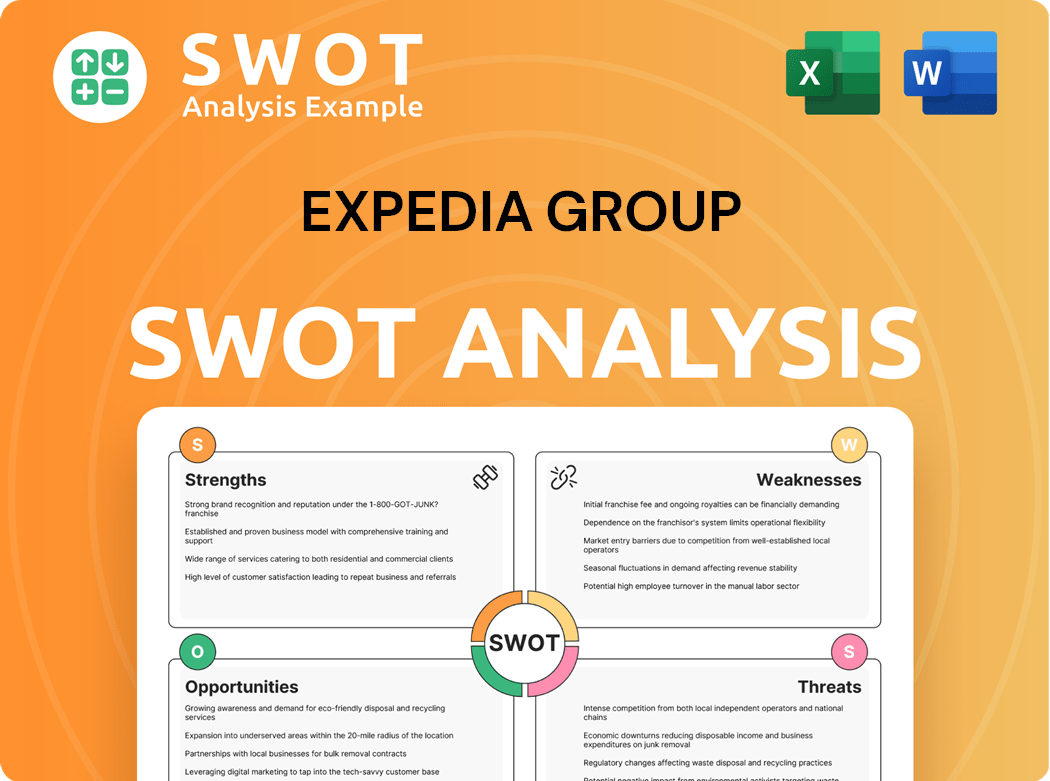
What Marketing Tactics Does Expedia Group Use?
The marketing tactics of the [Company Name] are a blend of digital and traditional methods, designed to boost brand awareness, generate leads, and drive sales. This strategy heavily relies on digital marketing, with a strong emphasis on content marketing, search engine optimization (SEO), and paid advertising. The company uses data-driven marketing, customer segmentation, and personalization to target content effectively across different channels.
The company's approach includes personalized recommendations for destinations, hotels, and vacation packages based on user preferences and past behavior. They also use AI and machine learning to analyze data, predict customer booking likelihood, and personalize search results. The company actively engages on social media platforms and collaborates with travel influencers to broaden its reach.
While digital strategies are central, traditional media like print advertising are also used to reach a wider audience. The marketing mix is evolving, with a focus on first-party data in anticipation of the deprecation of third-party cookies in 2025. The company's Artificial Creative Intelligence (ACI) system is also enhancing personalization and content generation capabilities.
The company leverages digital channels extensively for its Expedia Group marketing strategy. This includes SEO to improve search rankings, PPC advertising, and display ads to increase visibility. The focus is on driving organic traffic and targeting specific customer segments.
Data analysis and customer segmentation are core to the company's approach. They collect extensive user data to deliver personalized content and recommendations. AI and machine learning are used to predict booking behavior and enhance customer service.
The company maintains an active presence on social media platforms. This includes platforms like Facebook, Instagram, and YouTube. They also partner with influencers to increase brand awareness and promote services.
Despite the digital focus, traditional media is still used. This includes print advertising in travel magazines and newspapers. This approach helps reach travelers who are less active online.
The company is prioritizing first-party data in its marketing strategy. This is in anticipation of the deprecation of third-party cookies. This shift aims to maintain effective targeting and personalization.
The company's Artificial Creative Intelligence (ACI) system is used to improve personalization. It also helps to scale content creation. This system moderates a large volume of videos to optimize engagement.
The company's marketing tactics are multifaceted and aimed at maximizing reach and effectiveness. These tactics are crucial for its Expedia Group sales strategy.
- SEO and Content Marketing: The company invests heavily in SEO to ensure high rankings in search results. Content marketing initiatives are designed to attract and engage potential customers.
- Paid Advertising: PPC advertising and display ads are used to increase brand visibility. These ads target specific customer segments across various websites.
- Data-Driven Personalization: The company uses customer data to personalize recommendations. AI and machine learning are used to predict booking behavior and tailor search results.
- Social Media and Influencer Marketing: Active engagement on social media platforms and partnerships with travel influencers are key. These strategies boost brand awareness and promote services.
- Programmatic Advertising: AI-driven programmatic advertising is used to target consumers with relevant ads in real-time. This is based on their browsing history.
- Traditional Media: Print advertising in travel magazines and newspapers is used to reach a broader audience. This complements the digital marketing efforts.
Expedia Group PESTLE Analysis
- Covers All 6 PESTLE Categories
- No Research Needed – Save Hours of Work
- Built by Experts, Trusted by Consultants
- Instant Download, Ready to Use
- 100% Editable, Fully Customizable
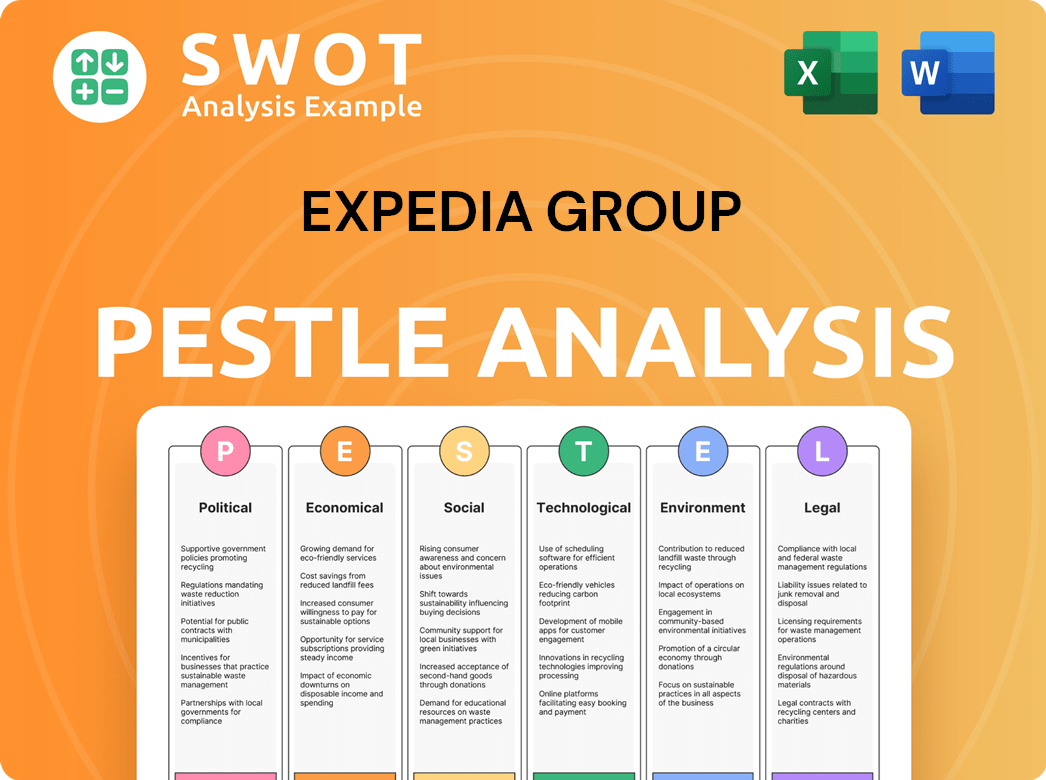
How Is Expedia Group Positioned in the Market?
Expedia Group positions itself as a leading online travel agency, simplifying travel planning and booking for a global audience. Its brand identity centers on providing a seamless travel experience, emphasizing convenience, reliability, and value. The core message is encapsulated by its tagline 'Where you book matters,' highlighting the importance of a hassle-free travel experience with a wide array of options.
The company differentiates itself through a diverse portfolio of brands, including Expedia.com, Hotels.com, and Vrbo, each catering to different customer segments and travel needs. This approach allows for effective geographic segmentation and brand differentiation, crucial in the competitive travel industry. The company's focus on customer experience and its ability to adapt to market trends are key elements of its brand positioning.
Expedia Group's target market primarily consists of tech-savvy millennials and experienced travelers. The company utilizes a dynamic pricing strategy, adjusting prices based on demand, competition, and seasonality to ensure competitive offerings. Furthermore, Expedia Group promotes bundled travel packages and incentivizes customer loyalty through its One Key rewards program, enhancing its customer relationship management (CRM) and driving repeat business.
The core message revolves around providing a hassle-free travel experience with a wide range of options and competitive pricing. This is encapsulated by its tagline 'Where you book matters.'
Expedia Group primarily targets tech-savvy millennials and seasoned travelers. The company's marketing strategies are tailored to appeal to these demographics through digital channels and personalized experiences.
Expedia Group differentiates itself through its extensive portfolio of brands, including Expedia.com, Hotels.com, and Vrbo. Each brand targets different customer segments and travel needs, allowing for effective market segmentation.
The One Key rewards program, launched in 2023, incentivizes customer loyalty by allowing users to earn and redeem points across Expedia, Hotels.com, and Vrbo. This helps foster repeat business and brand loyalty.
Brand consistency is maintained across channels through unified technology platforms, enhancing customer experience. Expedia Group continuously evolves its product and service offerings to meet changing consumer demands.
- Incorporating features like virtual tours and travel alerts to improve user experience.
- Focusing on sustainability features, allowing users to find eco-certified hotels.
- Offering mobile-exclusive deals to attract tech-savvy travelers.
- Adapting to shifts in consumer sentiment, such as providing options to offset carbon emissions.
Expedia Group Business Model Canvas
- Complete 9-Block Business Model Canvas
- Effortlessly Communicate Your Business Strategy
- Investor-Ready BMC Format
- 100% Editable and Customizable
- Clear and Structured Layout
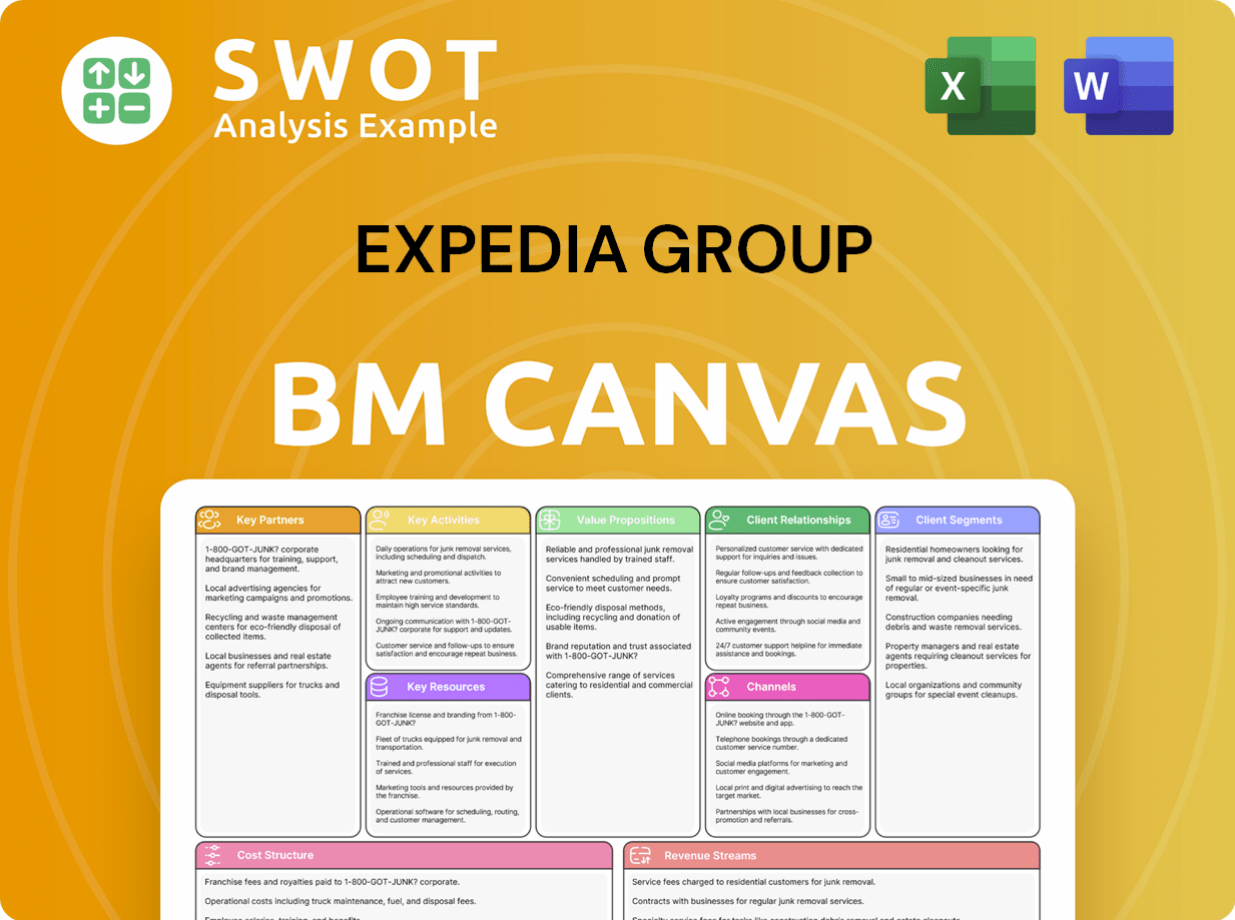
What Are Expedia Group’s Most Notable Campaigns?
The Expedia Group sales strategy is heavily influenced by its key marketing campaigns, designed to boost growth and solidify its brand presence in the competitive online travel agency market. These campaigns often leverage current travel trends and technological advancements to attract and retain customers. A core focus is on building customer loyalty and encouraging repeat business, which is critical for long-term success.
The company's Expedia Group marketing strategy involves a multi-faceted approach, incorporating digital marketing, targeted advertising, and strategic partnerships. The implementation of AI-driven features and personalized travel experiences further enhances customer engagement and drives bookings. By analyzing vast amounts of data, the company aims to offer tailored recommendations, improving customer satisfaction and increasing repeat bookings. Growth Strategy of Expedia Group highlights these initiatives.
These efforts are supported by data-driven insights and a commitment to adapting to market dynamics. For example, in Q3 2024, the One Key loyalty program saw its global active membership grow by 7% year-over-year. The 12-month member repeat rate increased by 150 basis points compared to the previous year, demonstrating the effectiveness of these strategies.
Launched in July 2023, this program unifies Expedia, Hotels.com, and Vrbo into a single rewards system. The aim is to shift from transactional to relationship-based customer interactions. This strategy focuses on driving repeat customers and acquiring new travelers across the brands.
The "Flight Deals" feature, introduced in 2025, targets budget travelers by offering fares at least 20% below typical prices. This campaign showcases the use of AI to analyze data, provide tailored recommendations, and enhance customer loyalty. Romie, an AI travel assistant, was piloted in 2024.
Expedia's Media Solutions arm conducts campaigns targeting specific demographics and traveler types. In Q4 2024, the company advised partners to use native advertising and sponsored listings like TravelAds and Flight Sponsored Listings to capture increased demand. These tools have shown significant results.
Properties using TravelAds see 90% more visibility and 120% more bookings compared to non-enrolled properties. During the 2024 Super Bowl, hotels in Las Vegas using TravelAds saw an average 5% boost in revenue. Campaigns around 'Tour Tourism' in 2024 increased travel searches by over 250% year-over-year for corresponding tour cities.
Expedia Group Porter's Five Forces Analysis
- Covers All 5 Competitive Forces in Detail
- Structured for Consultants, Students, and Founders
- 100% Editable in Microsoft Word & Excel
- Instant Digital Download – Use Immediately
- Compatible with Mac & PC – Fully Unlocked
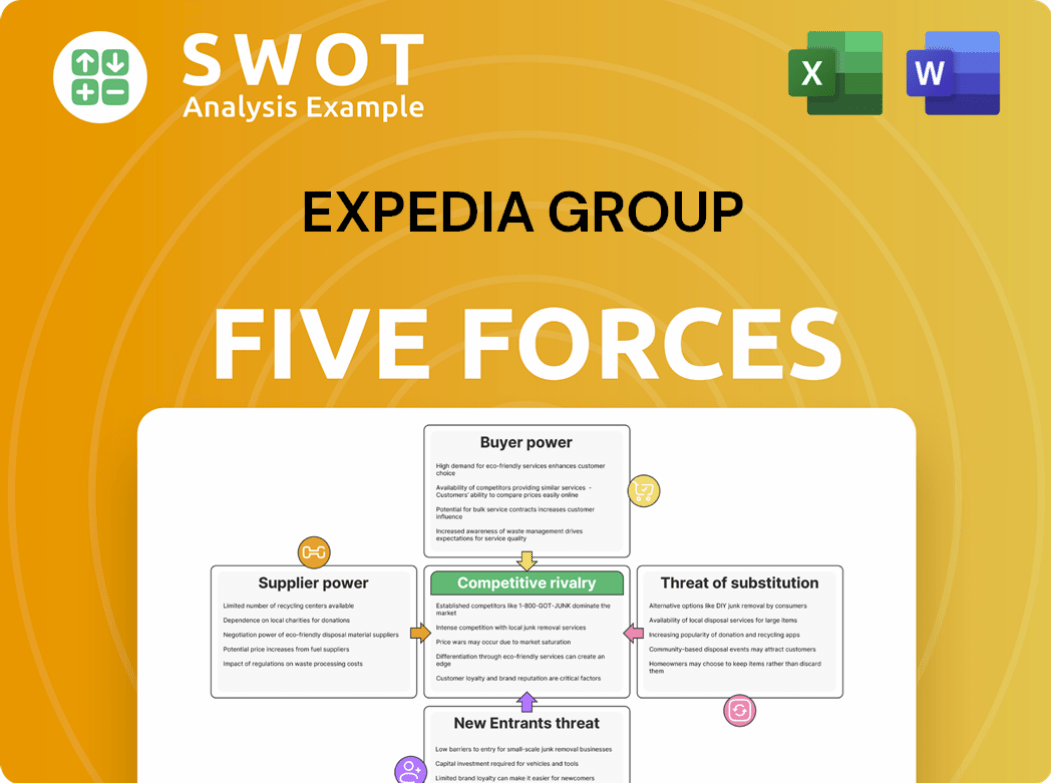
Related Blogs
- What are Mission Vision & Core Values of Expedia Group Company?
- What is Competitive Landscape of Expedia Group Company?
- What is Growth Strategy and Future Prospects of Expedia Group Company?
- How Does Expedia Group Company Work?
- What is Brief History of Expedia Group Company?
- Who Owns Expedia Group Company?
- What is Customer Demographics and Target Market of Expedia Group Company?
Disclaimer
All information, articles, and product details provided on this website are for general informational and educational purposes only. We do not claim any ownership over, nor do we intend to infringe upon, any trademarks, copyrights, logos, brand names, or other intellectual property mentioned or depicted on this site. Such intellectual property remains the property of its respective owners, and any references here are made solely for identification or informational purposes, without implying any affiliation, endorsement, or partnership.
We make no representations or warranties, express or implied, regarding the accuracy, completeness, or suitability of any content or products presented. Nothing on this website should be construed as legal, tax, investment, financial, medical, or other professional advice. In addition, no part of this site—including articles or product references—constitutes a solicitation, recommendation, endorsement, advertisement, or offer to buy or sell any securities, franchises, or other financial instruments, particularly in jurisdictions where such activity would be unlawful.
All content is of a general nature and may not address the specific circumstances of any individual or entity. It is not a substitute for professional advice or services. Any actions you take based on the information provided here are strictly at your own risk. You accept full responsibility for any decisions or outcomes arising from your use of this website and agree to release us from any liability in connection with your use of, or reliance upon, the content or products found herein.